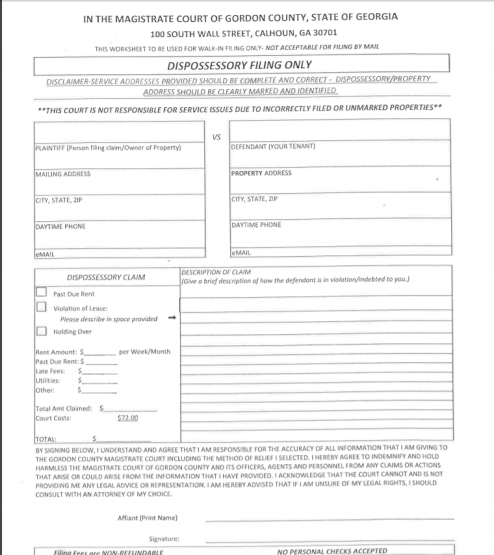What I learned at Magistrate Court
Yesterday I got to do something that all landlords are forced to do at one point or another. I had to go to court over a dispossessory that we had filled on a tenant due to non-payment.

We’ve been blessed. We’ve only been to court a total of four times in nearly a decade of landlording. That’s because most of the time, we’ve been able to work things out with the tenant, and they’ve left without us having to go to court. This time, however, the tenant answered the summons.
If you’re not familiar with what that means, filing for dispossessory goes as follows in the state of Georgia. First, you must notify the tenant with a letter of demand. The letter of demand will state what the issues are and how the tenant can fix those issues.
If the tenant doesn’t comply, you go to magistrate court and fill out an affidavit of dispossessory. This gets the case started in the court. The constable will then take that paperwork, which is called a summons, and serve the residents with it at the address listed on the affidavit for dispossessory.
The tenant then has seven days from the time they were served to “answer.” They can answer that they agree or disagree with the grievances listed on the affidavit. Either way, if the tenant answers, a court hearing is set.
We were notified that the tenant had answered our dispossessory and that a court hearing was set for the following day … which always produces a sinking feeling.
Now, if you’ve never been in this situation before, it’s inevitable that one day you will be there if you have rental property. So, it’s a good practice to prepare for court from day one with your tenants. That means all correspondences take place via email or texts. This practice establishes a time stamped and dated timeline that you can print out and use as evidence in court.

When you filled out the affidavit of dispossessory, you noted what your grievances were against the tenant. If you are going to court, you have to show the judge in a concise manner what the tenant agreed to and how they’ve not done what they promised.
To do this, take your lease and use a yellow highlighter to show what parts of the contract the tenant has violated. Then use a red sharpie to categorize each violation in order of importance. For example: 1. They aren’t paying on time. 2. They’re not communicating well, etc … Remember, you need to keep it concise.
Preparing in this way will give you a smooth-flowing case while giving the judge an overview of the contract.
Next, make yourself an outline using your red numbers as bullet points. Print out all the emails, letters of demand and texts that show how you talked to the tenant about each point and how the tenant responded. Highlight the dates associated with each.
Finally, make sure you make three copies of everything: one for you, one for the judge and one for the tenant.
When I showed up for court, the judge had us go first. We laid everything out in a clear concise way. Then the judge allowed the tenant to speak. They agreed with all the evidence we showed but took issue with our grievance that they hadn’t communicating well. They said they’d sent us emails that contradicted our grievance. They were, of course, unable to produce those emails at the judge’s request.
At the end of the day, we were awarded a money judgment, and the tenant was given seven days to vacate.
Before the ruling, the judge chastised us on something though. The tenant was late with the rent, incurring both a late fee a bounced check fee. Per our lease, these fees are considered additional rent. So, when we filled out the affidavit of dispossessory, we put as “total rent owed” the back rent plus those fees.
The judge said we should have separated the fees and the back rent on the affidavit. And since we did not, he would not award us those fees on the money judgment. Instead we were awarded just the back rent and court costs.
That was an expensive learning lesson.
Joe and Ashley English buy houses and mobile homes in Northwest Georgia. For more information or to ask a question, go to www.cashflowwithjoe.com or call Joe at 678-986-6813.
